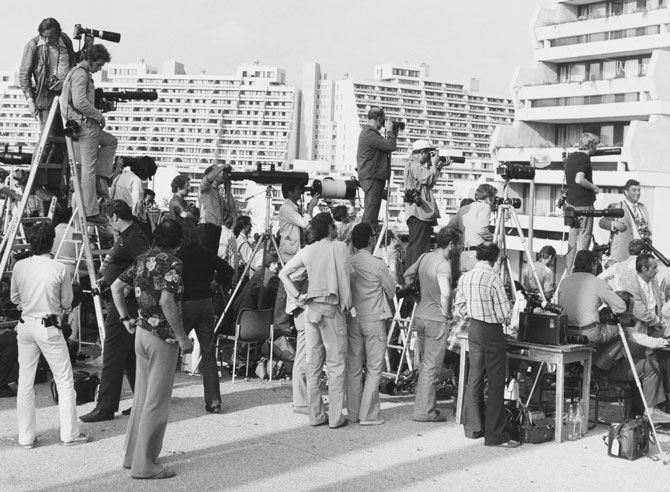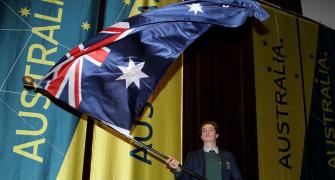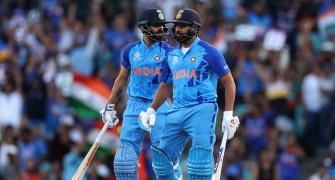
2020 Olympic Games host country Japan and the International Olympic Council decided on Tuesday to defer this year's Tokyo Games into 2021 as the coronavirus crisis obliterated the world's last major imminent sporting event.
It was the first time in the Olympics' 124-year history that they had been postponed, though they were cancelled outright several times during the two 20th century World Wars.
Here is a list of previous cancellations, boycotts and changes of venues of the Summer and Winter games.
CANCELLED GAMES
SUMMER OLYMPICS
| YEAR | HOST CITY | REASON FOR CANCELLATION |
| 1916 | Berlin | World War I |
| 1940 | Tokyo | World War II |
| 1944 | London | World War II |
WINTER OLYMPICS
| YEAR | HOST CITY | REASON FOR CANCELLATION |
| 1940 | Sapporo | World War II |
| 1944 | Cortina d'Ampezzo | World War II |
BOYCOTTS / BANS / COUNTRIES NOT INVITED / VENUE CHANGE
* 1908: The Games were due to be hosted in Rome but were moved to London in 1906 when the eruption of the volcano Vesuvius led Italy to divert funds to the rebuilding of Naples.

* 1948 (London): Germany and Japan were not invited due to their role in World War II while the Soviet Union did not participate.
* 1956 (Melbourne): Egypt, Iraq, and Lebanon did not participate due to the Suez Crisis.
Spain, Netherlands, Switzerland and Cambodia boycotted the Games because of the Soviet Union's participation.
China boycotted the Games as Taiwan was allowed to compete and only returned to competing in 1980.
* 1964 (Tokyo): North Korea, China and Indonesia boycotted the Games after the International Olympic Committee (IOC) refused to allow athletes who competed in the rival Games of the New Emerging Forces in Jakarta the year before.
South Africa was barred from participating during the apartheid era in 1964 and was expelled from the IOC in 1970. The country was re-admitted to the IOC in 1991 and allowed to compete at the 1992 Barcelona Games.

* 1972 (Munich): Rhodesia was banned from taking part a week before the Games when African countries threatened a boycott.
* 1976 (Innsbruck): The Winter Games were originally awarded to Denver in 1970 but it backed out two years later after public resistance and amid environmental concerns. The Austrian resort of Innsbruck stepped in instead.
* 1976 (Montreal): 29 countries, mainly African, boycotted the Games after the IOC refused to ban New Zealand, whose rugby team had toured apartheid South Africa that year.
Taiwan withdrew because Canada did not allow them to compete as the Republic of China.
* 1980 (Lake Placid): Taiwan boycotted the Winter Games after the IOC recognised the People's Republic of China as 'China' and asked Taiwan to compete under the name 'Chinese Taipei'.
* 1980 (Moscow): 66 countries, led by the United States, boycotted the Games due to the Soviet Union's invasion of Afghanistan although some athletes participated under the Olympic flag.

* 1984 (Los Angeles): 14 countries, including the Soviet Union, East Germany and its allies boycotted the Games in response to the American-led boycott in 1980.
* 1988 (Seoul): North Korea and Cuba boycotted the Games while five others either did not respond to the invitation or were unable to send athletes due to financial constraints.
* 2018 (Pyeongchang): Russia was banned by the IOC from the Winter Games due to a state-sponsored doping scandal and their athletes were only allowed to compete under the Olympic flag.
DISRUPTIONS
* 1972 (Munich): 11 Israeli athletes were killed by Palestinians who broke into the Olympic Village and events were suspended for more than 24 hours before the Games resumed.
* 1996 (Atlanta): A pipe bomb was detonated at the Centennial Olympic Park, killing two people and injuring 111, but the Games continued as planned.










